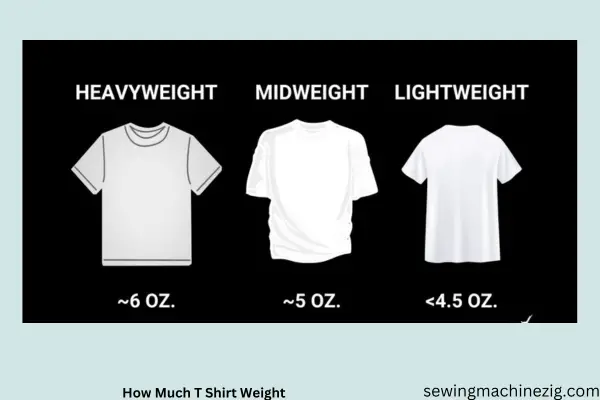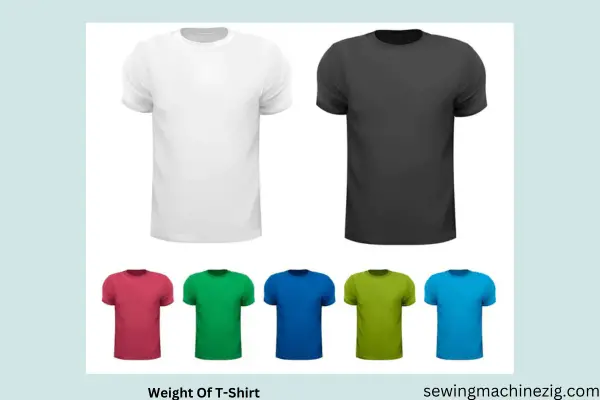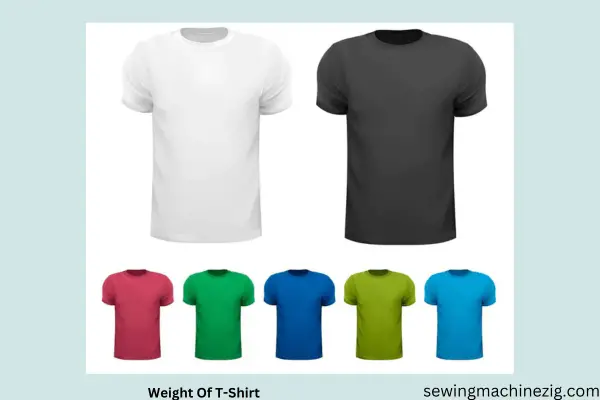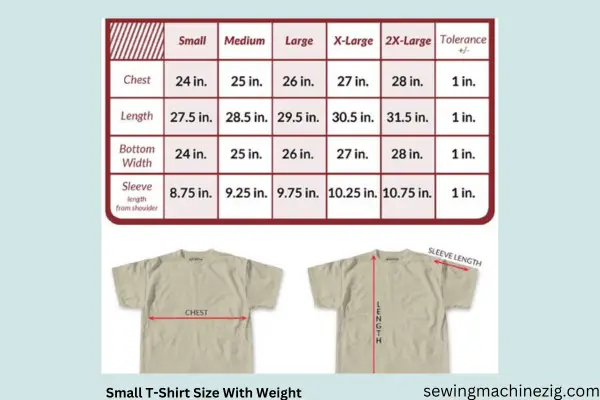
The weight of a T-shirt refers to the amount of fabric used in its construction and can vary depending on factors such as the type of fabric, style of the T-shirt, and intended purpose. So the question raised here is how much t shirt weight and what’s the role of it. The weight of a T-shirt plays a significant role in its comfort, durability, and overall feel when worn.
Thank you for reading this post, don't forget to subscribe!Understanding how much t shirt weight can help individuals make informed decisions when selecting the right T-shirt for their needs, whether it’s for casual wear, sports activities, or specific climates. In this article, we will explore how much t shirt weight, discuss Their significance, and provide insights into the different weight categories commonly found in the market.
Weight Of T-Shirt

The weight of a T-shirt can vary significantly depending on various factors such as the fabric type, design, and intended use. how much t shirt weight; well generally, the weight of a T-shirt is measured in ounces per square yard (oz/yd²) or grams per square meter (g/m²).
In terms of fabrichow much t shirt weight, T-shirts typically range from lightweight to heavyweight. Lightweight T-shirts, often referred to as “summer-weight” or “thin” T-shirts, usually weigh around 3-4 oz/yd² (100-135 g/m²). These T-shirts are ideal for warm weather and provide a breathable and lightweight feel.
T-Shirt Sizes With Weight

Medium-weight T-shirts, suitable for everyday wear, typically range from 5-6 oz/yd² (170-200 g/m²). They strike a balance between comfort and durability and are commonly found in the market.
Heavier or heavyweight T-shirts, weighing around 6 oz/yd² (200 g/m²) or more, are popular for their durability and sturdier feel. These T-shirts are often used for workwear, sports activities, or colder climates, providing additional insulation and a more substantial fabric presence.
Important Note:
It’s important to note how much t shirt weight can also be influenced by factors such as the blend of materials used, such as cotton, polyester, or a combination of both. Additionally, specific styles, such as fitted or relaxed-fit, may impact the perceived weight and feel of a T-shirt.
When choosing a T-shirt, consider how much t shirt weight is a personal preference based on factors like climate, comfort, and desired durability. Understanding the weight categories and their corresponding attributes can assist in finding the perfect T-shirt for individual needs and preferences.
How Much Does A Small T Shirt Weigh

The weight of a T-shirt can vary based on numerous factors, including size, fabric type, and design. When it comes to small-sized T-shirts, the weight tends to be lighter compared to larger sizes due to the reduced amount of fabric used. The weight of a small T-shirt is a crucial consideration for comfort, especially in warm weather or active situations.
Understanding the average weight range of small T-shirts can assist individuals in finding the perfect fit and feel. In this article, we will explore the typical weight of a small T-shirt, taking into account various factors that influence its overall weight and wearability.
Small T-Shirt Size With Weight

On average, a small-sized T-shirt may weigh around 4 to 6 ounces (113 to 170 grams) or approximately 0.25 to 0.375 pounds. However, it’s important to note that this weight can vary depending on the specific T-shirt style, fabric thickness, and any additional embellishments or features.
When purchasing a small T-shirt, the weight may not be a primary consideration, as comfort, fit, and fabric type are often more important factors to consider.
Conclusion:
The weight of a T-shirt is an important aspect to consider when selecting the right garment for your needs. While the weight can vary depending on factors such as fabric type, style, and purpose, it plays a significant role in the overall comfort and feel of the T-shirt. Lightweight T-shirts are ideal for warm weather, providing breathability and a light, airy feel.
Medium-weight T-shirts strike a balance between comfort and durability, making them suitable for everyday wear. Heavier or heavyweight T-shirts offer sturdiness and insulation, making them suitable for colder climates or more rugged activities. Understanding how much t shirt weight and the categories and their corresponding attributes helps individuals make informed choices that align with their preferences and specific requirements.
Whether you prioritize breathability, durability, or insulation, considering the weight of a T-shirt allows you to find the perfect balance between comfort and functionality.
FAQs:
Q 1: What Does “T-Shirt Weight” Refer To?
A: T-shirt weight refers to the measurement of the fabric used in the construction of a T-shirt. It indicates the density or thickness of the fabric and affects the overall feel and durability of the garment.
Q 2: How Is T-Shirt Weight Measured?
A: T-shirt weight is typically measured in ounces per square yard (oz/yd²) or grams per square meter (g/m²). It quantifies the weight of the fabric used in a T-shirt.
Q 3: What Is Considered A Lightweight T-Shirt?
A: Lightweight T-shirts generally range from 3 to 4 ounces per square yard (100 to 135 g/m²). These T-shirts are often preferred for warmer weather as they offer breathability and a lightweight feel.
Q 4: What Is The Range For Medium-Weight T-Shirts?
A: Medium-weight T-shirts typically range from 5 to 6 ounces per square yard (170 to 200 g/m²). They strike a balance between comfort and durability, making them suitable for everyday wear.
Q 5: What Defines A Heavyweight T-Shirt?
A: Heavyweight T-shirts typically weigh around 6 ounces per square yard (200 g/m²) or more. These T-shirts are known for their sturdiness and are often favored for colder climates or more demanding activities.
Q 6: Does T-Shirt Weight Affect Its Durability?
A: Generally, heavier-weight T-shirts tend to be more durable due to the denser fabric construction. However, the durability also depends on other factors such as the quality of the fabric and the stitching techniques used in manufacturing.
Q 7: How Does T-Shirt Weight Impact Comfort?
A: T-shirt weight affects comfort in different ways. Lightweight T-shirts offer breathability and a softer drape, ideal for hot weather. Medium-weight T-shirts strike a balance between breathability and structure. Heavyweight T-shirts provide a more substantial feel and can offer additional insulation in colder climates.



